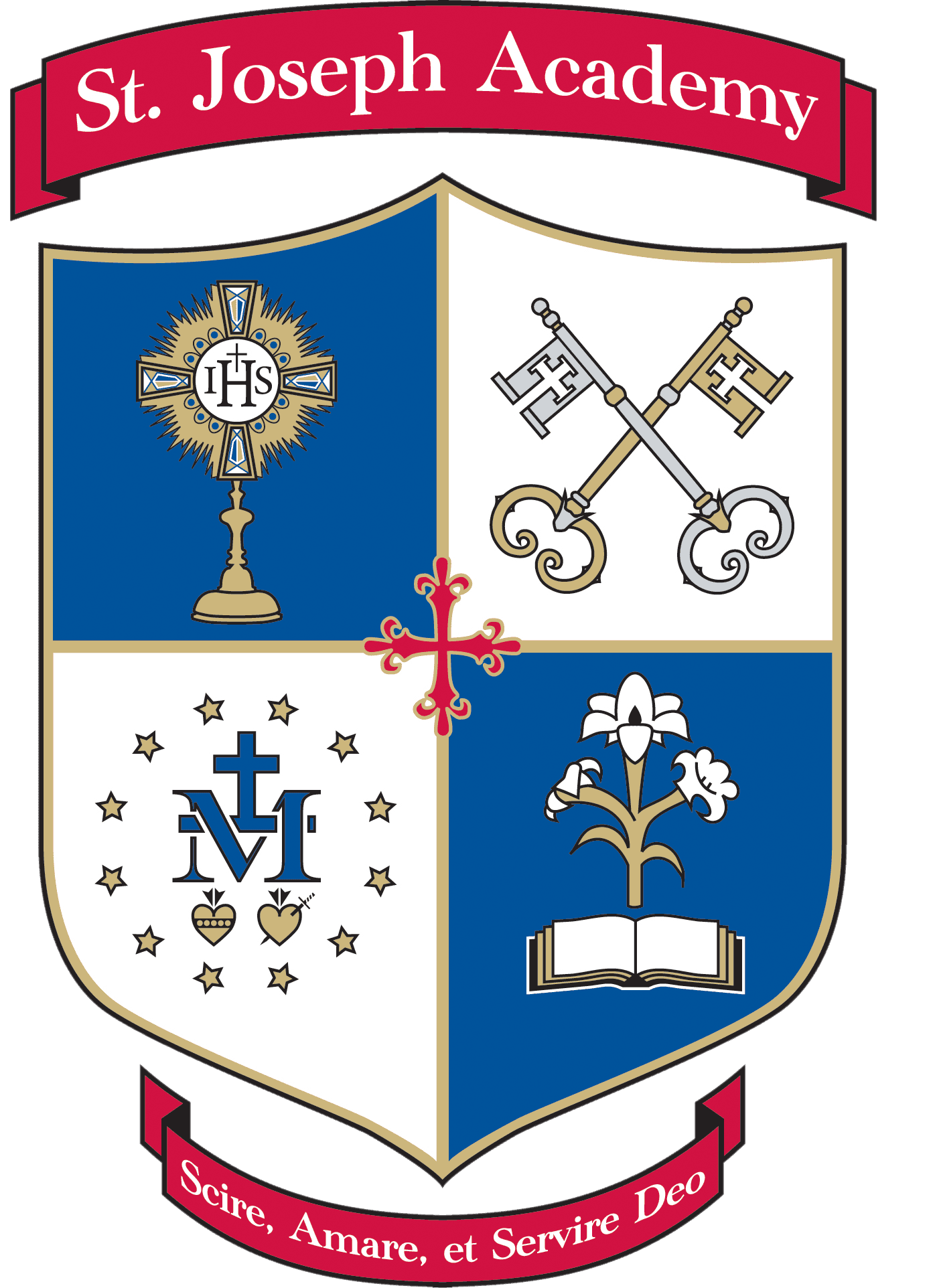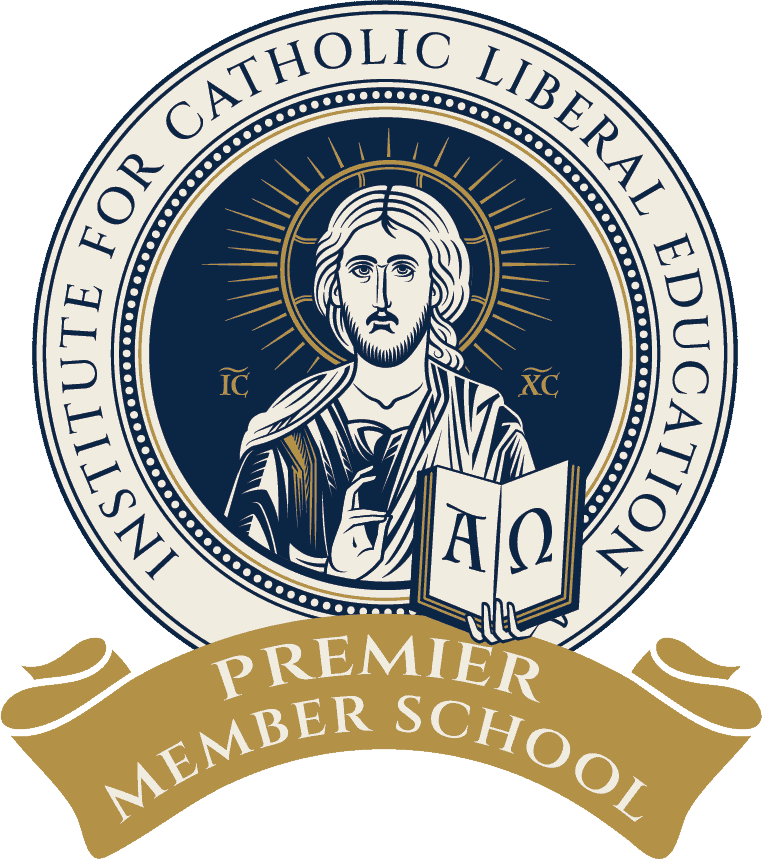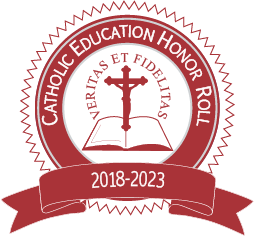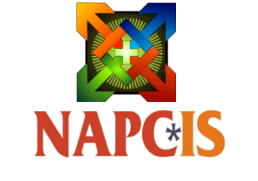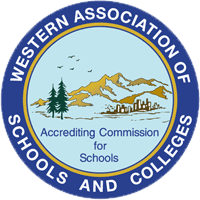TK-8 Curriculum
TRANSITIONAL KINDERGARTEN - 8TH GRADE CURRICULUM
Teachers use time honored curriculum and teaching practices that actively engage students at a high level of learning. Students demonstrate creative thinking, problem solving, and knowledge attainment and application skills. Students also utilize resources for learning beyond the limits of the textbook such as effective use of and appropriately limited technology, library/media resources, and community resources.
RELIGION
Students are taught the truths of the Catholic Faith and to know, love, and serve God.
From knowledge of the truths of the Faith, the students develop a true love of God and as a result, a true desire to serve God. Students receive religious education in every grade. There is a logical continuity of the material given to the students year to year. Students are also given the proper instruction and formation for the reception of the Sacraments of Confession, First Holy Communion, and Confirmation. Teachers give realistic situations and applications for the students to apply their faith to daily life. With an emphasis on apostolic works, students are encouraged to engage in social programs at the local level, wider communities, and globally. Students are also offered the opportunity to participate in pro-life contests and events. A "Works of Mercy" program is in place that give students TK-12 the opportunity to participate in charity work on a regular basis. Our "Education in Virtue" program, grades TK-5 and “Virtue=Strength” program, grades 6-8, encourage students to practice a different virtue each month.
Controversial issues are addressed according to their relevance and appropriateness per grade level. For example: Pro-life issues deal mostly with supporting babies and their mothers in the younger grades. More detail is given in the older grades as the students mature. The Catholic Church's teaching and rationale is always given. Sensitive issues (such as sex education/family life) are discussed by parents and their children in the privacy of their own home at a time deemed appropriate by the parents.
*Daily classes in the Catholic faith
- Based upon the Magisterium of the Roman Catholic Church
- TK & K : Image of God grade TK & K by Ignatius Press.
- 1st – 8th "Faith and Life" program by Ignatius Press ; Endorsed by the Pontificium Consilium Pro Familia
- Catechism of the Catholic Church, The Ignatius Bible and the
Baltimore Catechism (updated) are used as a supplement.
WRITING
Students utilize a comprehensive writing program.
SJA utilizes the Shurley Grammar Writing Program that presents writing as a process. We also utilize Writing With Ease, Classical Composition (from Memoria Press), Classical Academic Press “Writing and Rhetoric”, and I.E.W. programs as well. Writing across the curriculum, including various topics and genres, is necessary to develop good writing skills. The benefits of frequent writing builds confidence and skills in student writers. Students are given frequent opportunities to write, assess and revise their own writing, build grammar, punctuation and spelling skills, and develop their literacy skills. Students are encouraged to develop their writing over time in 5 recursive stages that mirror the stages that expert writers go through: prewriting, drafting, revising, editing or proofreading, and publishing. The students are also taught the six- traits (ideas, organization, voice, sentence fluency, word choice and conventions) of effective writing to help develop themselves as skillful, independent writers. Students are expected and required to use neat, legible writing in all of their work.
PHONICS
Saint Joseph Academy utilizes intensive Phonics programs, the Spalding method in TK, “Fundations” is used in K and 1 st grade.
Our teachers undergo training seminars in order to learn these methods, and are given yearly updates and refresher in-services. These Phonics programs allows the use of all modalities: sight, hearing, and kinesthetics. Students use repetition and practice to remember the sounds of the letters and the rules of grammar. These programs not only teach reading, but writing, spelling and comprehension as well. The reading scores of the students increase dramatically when using these methods as demonstrated in objective evaluations.
GRAMMAR
Students receive a thorough, in-depth education regarding all parts of speech.
Our program, Shurley Grammar (grades 1-8) is used to teach the proper use of language, as well as Classical Academic Press’s ”Well Ordered Language”program. The foundation of good English grammar is essential. The students are taught to detect and correct errors in word usage and sentence structure. Speaking and writing skills are also taught. Students learn the parts of speech by practicing them orally, by written work and board work. Students break down the sentence by diagramming all of its parts grades 2-8. Diagramming sentences gives the students a visual concept of the critical thinking skills that are being employed. New concepts are built upon previous understandings, enabling the students to use the structure of the English language as a well-planned whole rather than as many isolated facts with little coherence.
LITERATURE
Students in grades K-1 read short stories and phonetic readers to build their reading and comprehension skills. The Accelerated Reader program is also utilized. Grades 2-8 read classic novels (one per quarter) that includes comprehension as well. The program is organized around important literary themes. Thematic organization of literature encourages students to share and compare ideas about characters encountered, issues raised and values presented. Emphasis on reading and appreciation of literature is placed. Students are taught to read critically and analyze literature. Comprehension is
built on 3 levels: the literal, the interpretive, and the applied. Constructive response after reading is fostered. Knowledge and appreciation of language is developed in each section. Writing is an important part of the program. It may be creative or analytical, is process-orientated, suggesting steps for prewriting, drafting, and revising. Additional classical works of literature, short stories, and poems are read by all students. Teacher led evaluations of fiction on themes; characters, etc. are conducted on a regular basis. Moral issues that surface are evaluated from a Catholic perspective.
SPELLING/ VOCABULARY
Students in grades K-1 utilize their Phonics method for daily/weekly spelling words. Grades 2-5 utilize Evan-Moor Spelling (one grade level up). Students in grades 6, 7 and 8 utilize Sadlier Oxford vocabulary books. Regular exposure to spelling and vocabulary lessons increases the students' writing and comprehension skills.
MATHEMATICS
The mathematics program challenges students at their particular level of ability in math in preparation for high school and life.
The math program is designed to develop logical reasoning skills and firm foundation in math facts. Problem solving questions are included in the textbooks. Mathematical reasoning is emphasized. Each year builds upon the last to form a solid foundation in concepts. Mental-math and board drills are also utilized to reinforce the concepts taught. The ultimate goal is to teach each student to have a solid foundation in mathematical facts and to think, to understand, and to be able to communicate mathematical ideas. Students are given the unique opportunity to advance and work at the level math in which they are competent. Saxon Math (earlier edition devoid of Common Core math concepts) is used in grades TK-5. Prentice Hall Mathematics Course 1, 2 and 3 is used in grades 6-8.
HISTORY
The primary goal of our History program is to enable each student to gain knowledge about our historical foundations (especially based in Western Civilization and Christian foundations), develop intellectual skills, and assume a sense of responsibility as members of their Church, community, culture, and world.
To achieve this purpose, a core of courses encompassing historical and geographical studies is required of each student. Logical thinking and communication skills, both written and verbal, are stressed throughout the program. All history lessons seek to explain the Catholic Church's role in history. This allows the students to receive a good understanding of their heritage in regards to their Faith. Students also study geography and mapping on a yearly basis. Class projects and field trips help bring alive historical events. Students are also encouraged to become loyal, patriotic, and responsible United States citizens, who take pride in their country and practice their civic duties. The students participate in the Pledge of Allegiance every morning (an American flag is displayed in every room). National holidays such as Veterans and Memorial Day, President's Day, voting day, etc. are explained and celebrated. Historical poems/speeches are memorized in various grade levels every year, for example: The Flag Goes By (3rd grade), The Gettysburg Address (4th grade) and Paul Revere's Ride (5th grade).
K -
Community workers and geography
1 -
Ancient Greeks
2 -
Ancient Romans
3 -
Early American History
4 -
California History / Modern Year
5 -
Mid- Modern American History
6 -
Old World History
7 -
U.S History
8 -
World History
SCIENCE
Science in the early grammar stage years is presented both as an opportunity to learn about the basics of Earth, Life, and Physical science that surround us everyday and the opportunity to experience hands-on, in-depth study of a particular scientific area such as butterflies, the ocean, dinosaurs, and the solar system. Grade 6 focuses on Earth Science, grade 7 focuses on Life Science, and grade 8 focuses on Physical Science. God as Creator always takes precedence in presenting material. Evolution is presented in accordance with the teachings of the Catholic Church. Lab experiments are provided in each chapter for a "hands on" approach to learning to bring the information "to life". Science related video clips, 3 dimensional models, posters, and field trips all enhance the science curriculum.
Students in grades 6, 7, and 8 are required to produce Science Fair project based upon the criteria that the Greater San Diego Science and Engineering Fair requires (strict experimental guidelines). We have an average of 4-6 entries each year in this Fair, with as many as three winners chosen to go to the State Fair. The Science Fair projects of the 7th and 8th grade students are presented to the parents on "Science Fair Night" in January. Students display their projects and are available for questioning and comments by parents. First, Second, and Third place winners are chosen from each grade level.
FOREIGN LANGUAGE: LATIN (K-8)
Click here for the Top 10 Reasons To Study Latin.
COMPUTER ROLLING LAB/CART
SJA has a state of the art computer rolling lab/cart. There are 38 stations chrome books that are used throughout the day. The Computer Lab is used by 4 th and 5 th grades to learn keyboarding. It is also used on a limited basis for research papers and producing the 7 th grade Civil War newspaper.
ART PROGRAM
Art and art appreciation is encouraged throughout the curriculum.
Saint Joseph Academy has a unique program, Arts Attack, in grades K-8. Art is taught once a week by our Art Teacher. Students are exposed to famous artists and their art on a regular basis through our "Art in Action" program. Selected works of art are explained to the students and then the students are given the opportunity to replicate the piece through different mediums. Art classes offer hands on activities that allow the students to see the accomplishments of their efforts. The students' art projects are showcased annually at the end of the year. Artistic expression is also encouraged throughout the curriculum, such as having students illustrate history related time lines or projects. In SJA’s art classes, beauty is emphasized—not as a subjective value in the eye of the beholder— but as an objective transcendental which points to the ultimate measure of true beauty: God himself.
MUSIC/CHOIR PROGRAM
Choir is included weekly grades K-8. Students also learn note reading, Gregorian Chant, and music appreciation.
*School Band:
SJA has contracted with Paul Effman Music Service to offer "band" musical lessons for our students. The school band holds a presentation of various musical scores at the end of the school year for students, staff, and families.
PHYSICAL EDUCATION
Physical Education constitutes an important component in the development of the whole person.
Saint Joseph Academy's Physical Education program is based on the premise that the quality and productivity of each individual's life can be enhanced through participation in a comprehensive, sequential, physical education routine. Emphasis is placed on developing motor skills and muscular strength through regular stretching exercises and repetitive muscle exercises. Aerobic and team sports are emphasized. Competitive sports are encouraged, always emphasizing team spirit and good sportsmanship. The students are encouraged to develop a life-long program of physical well-being.
Physical Education is taught in units/quarters. The students play a variety of competitive sports within their weekly P.E. classes. Technique instruction and skill progression in various sports The "Mile Club" includes students who are able to run the mile in a specific amount of time according to national standards. An opportunity to compete for inclusion in the Mile Club is offered every month during physical education class. A "Gold Star" award is given monthly to a boy and girl who exhibit exemplary behavior in physical education class. Students are prepared for the Presidential Physical Fitness awards throughout the year and are tested in May for qualification of this award.
